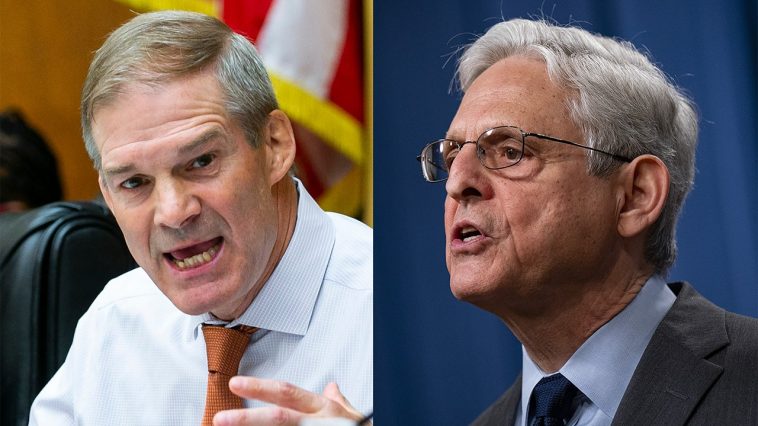The House Judiciary Committee, steered by the formidable Rep. Jim Jordan (R-OH), advanced a resolution on Thursday to hold Attorney General Merrick Garland responsible for breaching Congressional standards. This action is deemed necessary because the Department of Justice (DOJ) could not provide the potentially damning audio clip of an interview President Joe Biden had with Special Counsel Robert Hur. The interview was a part of an investigation into the President’s alleged mismanagement of sensitive material.
In a surprising display of executive power, the White House intervened to declare executive privilege over the contentious recording only a few hours before the committee vote. The purpose of this maneuver was an attempt to insulate Garland from the imminent contempt vote.
Assistant Attorney General for Legislative Affairs at the DOJ, Carlos F. Uriarte, underscored that the invocation of executive privilege naturally results in contempt of Congress not being pursued in many instances. This sentiment was voiced in a letter addressed to both Chairman Jim Jordan and Chairman James Comer (R-KY).
Uriarte added that while the DOJ has made extensive efforts to cooperate with Congress, it is vital to maintain the discretion of law enforcement files. Any disclosure of such material might compromise forthcoming investigations. He further formalized that it is the prerogative of the Attorney General to establish a demarcation to protect the Department from undue political influence and safeguard the essence of their work.
‘An official asserting the President’s claim to executive privilege is typically free from prosecution for criminal contempt of Congress,’ stated Uriarte, noting the long-held position of the executive branch that is respected across bipartisanship. He stressed that this practice supports the independent execution of their law enforcement duties.
Uriarte entreated Jordan and Comer in the letter to reconsider their contempt resolutions. He substantiated his request by referencing a similar scenario in 2008 involving Vice President Dick Cheney. At that time, the House legislators decided against a contempt resolution following President George W. Bush’s invocation of executive privilege.
Despite the President’s last-minute effort to protect Garland, Chairman Comer remained unperturbed. In response to the intervention by the White House, he articulated that the President’s move would not bring about any changes to the plan of action of their committee.
Chairman Comer voiced his determination in a public statement. He articulately expressed, ‘The attempt to mount a last-minute defense for Garland by the White House will not shift the direction of our committee. We remain committed to forwarding a resolution and report recommending to the House of Representatives that Attorney General Garland be held in contempt of Congress for not complying with a legitimate subpoena.’
The resolution concerning Garland’s potential contempt of Congress is set to travel to the House floor for voting. Despite the theoretical implications, the likelihood of this decision leading to any incrimination against Garland remains speculative.
In the midst of this political stir, the Biden White House appears unyielding in their determination to prevent the recording’s disclosure to the general public. Their obstinacy raises some questions considering the implications of the recording’s content.
As previously disclosed by the DC Enquirer, Hur’s report underlined concerning findings about the extent of Biden’s cognitive deficiencies. It relayed that during the interview, the President had lapses in memory regarding the tenure of his vice-presidency under the Obama administration, and even more concerning, about the timeline of his son Beau’s tragically early demise.
The report detailed, ‘During our office’s interaction with Mr. Biden, his forgetfulness was more pronounced. He could not recall the dates of his tenure as vice president, expressing confusion on the first day about the end of his term, and then on the second day showing uncertainty about the start of his term.’
The report further highlighted, ‘Mr. Biden’s recollection of when his beloved son Beau passed away was also staggeringly inaccurate. It was not just by a few days or months, but by a number of years.’
Additionally, the report evoked concerns over Biden’s clarity of thought regarding crucial policy debates. ‘His memory exhibited foggy recall when he attempted to recount the Afghanistan debate. It’s noteworthy because this was a topic of critical importance to him once upon a time.’
Given the significant findings in the report, the withholding of the audio interview by the White House is likely strategic. The revelation of such cognitive lapses could influence public perception and trust in the current administration.
Regardless of the political strategies and power dynamics at play, the events surrounding the proposed contempt resolution against Attorney General Merrick Garland are a profound reminder of the importance of transparency, respect for Congressional procedures, and the need to uphold the principles of our nation’s democracy.



